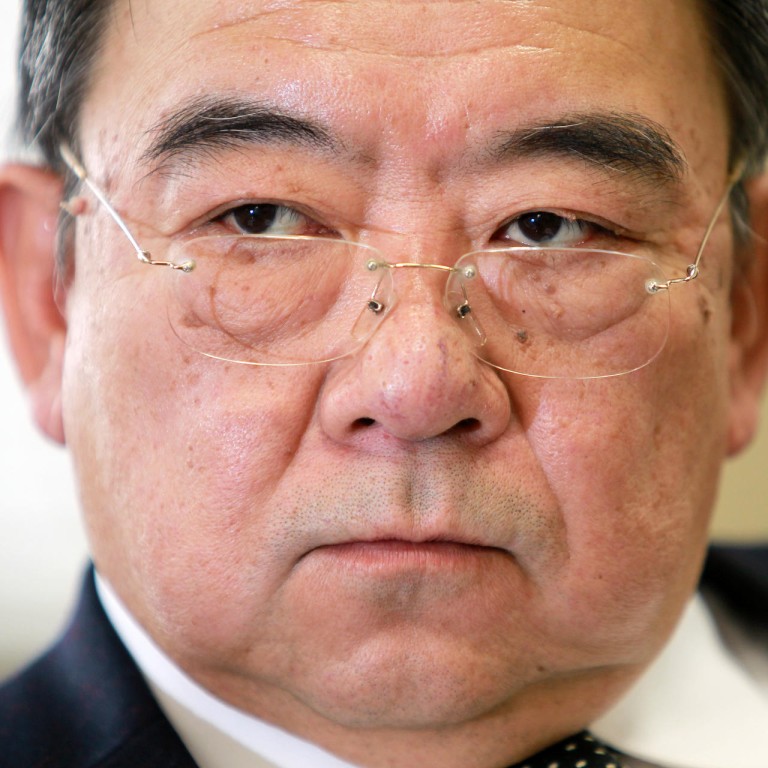
Japan's ambassador to China Masato Kitera says his job is an uphill battle
Masato Kitera reports little progress in his efforts to engage senior leaders in Beijing
Masato Kitera, Japan's ambassador to China, says he faces an uphill diplomatic battle after trying for more than a year to bridge the escalating differences between Asia's two major powers.
Despite his best efforts to make friends since arriving in Beijing in December 2012, the veteran diplomat said he had enjoyed little luck in engaging senior Chinese leaders, other than officials from the Ministry of Foreign Affairs.
"I have visited many places and have tried to meet as many Chinese people as possible. However, to me, meeting Chinese leaders is still very difficult," Kitera said. "I have put my effort over the last year into improving the relationship between Japan and China, but it is not easy."
Kitera was faced on arrival with strained Sino-Japanese ties after Japan said in September 2012 that it would purchase three of the disputed Diaoyu Islands - known as the Senkakus in Japan - from their Japanese owner.
The relationship between the countries continued to deteriorate after Japanese Prime Minister Shinzo Abe visited the Yasukuni Shrine that honours 14 Class A war criminals in December, prompting Foreign Minister Wang Yi to summon Kitera to lodge a formal protest.
Beijing later named Abe an "unwelcome" person - a remark widely seen as an indication that it had ruled out high-level dialogue with Tokyo.
The Japanese envoy said communication with the Chinese foreign ministry was smooth and that he had visited many provinces to engage with Japanese businessmen, Chinese students learning Japanese and others with an interest in Sino-Japanese ties.
But forging contact with government leaders was a problem. "It is difficult for me to meet with leaders of local governments when I [travel around the country] because of the challenging situation with political ties between Japan and China," he said.
Kitera said the situation facing the two nations was "difficult", but Japan had no intention of escalating the tensions.
"Since the end of the second world war, Japan has continued to pursue the path of a peace-loving nation, and Prime Minister Abe's cabinet will never change this course," he said. "Japan has been consistent in handling the situation resolutely and calmly."
He called for senior leaders of both nations to resolve their disputes peacefully. "There are difficulties between the two nations, and because of that it is important to engage in direct communications at a high level," he said. "The door for [high-level] dialogue with China remains open on the Japanese side."
Kitera expected the challenges facing him in his role to continue this year, but said he was confident the two countries would pay regard to their "mutually beneficial relationship based on common strategic interests" and take measures to prevent disputes from jeopardising long-term ties.
"The relations between Japan and China have become very wide and deep after 41 years of the normalisation of ties."
He said economic co-operation between China and Japan continued despite the political tensions. Some 23,000 Japanese companies are operating in China, creating about 10 million job opportunities.
He said China and Japan could also strengthen co-operation in tackling pollution, enhancing food safety and coping with an ageing society. Japan also aims to boost the number of foreign tourists to 20 million when it hosts the Olympics in 2020, and will look to expand exchanges with China through sports and tourism.
Kitera had no extensive China experience before taking up his post. He was responsible for African affairs in Japan's foreign ministry and has served in Japanese missions in France, Switzerland and Thailand.
His appointment to Beijing came after his predecessor, Uichiro Niwa, was recalled to Japan after he said Tokyo's plan to purchase the uninhabited islands in the East China Sea would damage bilateral ties. Tokyo first named Shinichi Nishimiya to replace Niwa, but the appointment finally went to Kitera because Nishimiya collapsed on a Tokyo street and later died.
On a lighter note, speaking of the challenges he faced in China, Kitera said he needed to get used to writing calligraphy.
"I am asked to write calligraphy when I visit various Chinese places," he said. "I am not good at writing, and I sweat every time when I see the writing brush and the paper."
He also enjoys walking in tourists spots in Beijing, where he said he met friendly people.
"I went to the Badaling Great Wall with my mother in a wheelchair. When we were going down some long stairways, some Chinese people held the wheelchair for us," he said.

